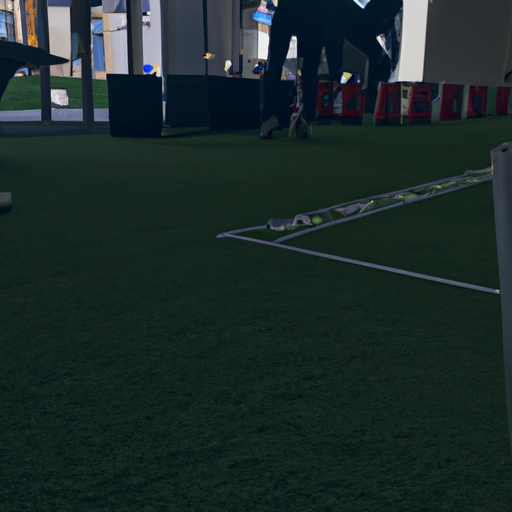For wannabe sportscasters

Essential Skills and Qualities for Aspiring Sportscasters
For wannabe sportscasters, there are several essential skills and qualities that aspiring individuals must possess. Sportscasting is a highly competitive field, and having the right skills and qualities can make all the difference in standing out from the crowd and securing a successful career in this industry.
First and foremost, aspiring sportscasters must have a deep knowledge and passion for sports. This goes beyond just being a fan of a particular team or sport. It requires a comprehensive understanding of the rules, strategies, and history of various sports. This knowledge will not only help in providing accurate and insightful commentary but also in engaging with viewers and fans who expect expert analysis and opinions.
In addition to knowledge, aspiring sportscasters must also possess excellent communication skills. This includes both verbal and written communication. Verbal communication is crucial for delivering play-by-play commentary, conducting interviews, and providing analysis during live broadcasts. Clear and concise articulation, along with the ability to think on your feet, is essential in this fast-paced environment.
Written communication skills are equally important, as sportscasters often write scripts, articles, and reports. Being able to convey information effectively and engagingly through the written word is a valuable skill that can enhance a sportscaster’s career prospects.
Another essential skill for aspiring sportscasters is the ability to work well under pressure. Live broadcasts can be unpredictable, and sportscasters must be able to handle unexpected situations with composure and professionalism. This includes staying calm during technical difficulties, adapting to last-minute changes in the script, and maintaining a positive attitude even in high-pressure situations.
Furthermore, aspiring sportscasters must be highly adaptable and flexible. The sports industry is constantly evolving, and sportscasters must be able to keep up with the latest trends and technologies. This may involve learning new software, mastering social media platforms, or even branching out into other forms of media such as podcasting or video production. Being open to learning and embracing new opportunities is crucial for long-term success in this field.
In addition to skills, aspiring sportscasters must possess certain qualities that can set them apart from the competition. One such quality is a strong work ethic. Sportscasting requires long hours, irregular schedules, and a commitment to continuous improvement. Those who are willing to put in the time and effort to hone their craft are more likely to succeed in this demanding industry.
Another important quality is professionalism. Sportscasters are often the face of a sports network or organization, and they must conduct themselves with integrity and respect. This includes treating colleagues, athletes, and viewers with courtesy, maintaining a high level of preparedness, and adhering to ethical standards.
Lastly, aspiring sportscasters must have a genuine love for storytelling. Sports are not just about the final score; they are about the narratives, the emotions, and the human drama that unfolds on the field. Being able to capture and convey these stories in a compelling and engaging manner is what sets great sportscasters apart from the rest.
In conclusion, aspiring sportscasters must possess a combination of essential skills and qualities to succeed in this competitive field. A deep knowledge and passion for sports, excellent communication skills, the ability to work well under pressure, adaptability, a strong work ethic, professionalism, and a love for storytelling are all crucial for aspiring individuals. By developing and honing these skills and qualities, wannabe sportscasters can increase their chances of securing a successful career in the exciting world of sportscasting.
Tips for Building a Strong Sportscasting Portfolio

For wannabe sportscasters, building a strong sportscasting portfolio is essential to kick-starting a successful career in the industry. A portfolio serves as a showcase of your skills, experience, and expertise, allowing potential employers to gauge your abilities and suitability for various sportscasting roles. In this article, we will provide you with some valuable tips on how to create a compelling sportscasting portfolio that will impress hiring managers and increase your chances of landing your dream job.
First and foremost, it is crucial to include a variety of samples in your portfolio that demonstrate your versatility as a sportscaster. This means including clips from different sports, such as football, basketball, baseball, and soccer, to showcase your ability to adapt to various game dynamics and provide insightful commentary. Additionally, consider including samples from different types of broadcasts, such as live games, pre-game shows, post-game analysis, and interviews. This will highlight your ability to excel in different formats and settings.
When selecting the samples for your portfolio, choose those that best showcase your strengths and abilities. Focus on clips where you displayed exceptional play-by-play commentary, insightful analysis, or engaging interviews. It is important to demonstrate your ability to captivate the audience and provide valuable insights that enhance their viewing experience. Remember, quality is more important than quantity, so be selective and only include your best work.
In addition to video clips, it is also beneficial to include a written component in your portfolio. This can take the form of articles, blog posts, or even social media posts where you have provided sports analysis or commentary. Including written samples will demonstrate your ability to articulate your thoughts and opinions effectively, which is a valuable skill for any sportscaster. Make sure to proofread and edit your written samples to ensure they are error-free and well-written.
Another important aspect of building a strong sportscasting portfolio is showcasing your knowledge and expertise in the sports industry. Consider including a section where you highlight your understanding of the game, rules, strategies, and players. This can be done through written analysis, statistics, or even infographics. Demonstrating your deep knowledge of the sports you cover will make you a more credible and valuable asset to potential employers.
Furthermore, it is essential to keep your portfolio up to date. As you gain more experience and improve your skills, make sure to regularly update your portfolio with your latest work. Remove any outdated or weaker samples and replace them with newer, stronger ones. This will show potential employers that you are committed to continuous improvement and staying current in the industry.
Lastly, make your portfolio easily accessible and user-friendly. Consider creating a professional website or using a platform specifically designed for showcasing portfolios. Ensure that your videos are of high quality and can be easily viewed and heard. Organize your samples in a logical and intuitive manner, making it easy for potential employers to navigate through your work.
In conclusion, building a strong sportscasting portfolio is crucial for aspiring sportscasters. By including a variety of samples that showcase your versatility, selecting your best work, including a written component, demonstrating your knowledge and expertise, keeping your portfolio up to date, and making it easily accessible, you will increase your chances of impressing potential employers and landing your dream job in the sportscasting industry. So, start building your portfolio today and take the first step towards a successful career in sportscasting.
Navigating the Path to Becoming a Professional Sportscaster
For wannabe sportscasters, navigating the path to becoming a professional sportscaster can be a challenging and competitive journey. However, with the right skills, knowledge, and determination, it is possible to break into this exciting field. In this article, we will explore the steps you can take to pursue your dream of becoming a professional sportscaster.
First and foremost, it is essential to develop a strong foundation in sports knowledge. As a sportscaster, you will be expected to have a deep understanding of various sports, including their rules, strategies, and history. Start by immersing yourself in the world of sports. Watch games, read books and articles, and listen to sports podcasts. This will help you build a solid knowledge base and stay up-to-date with the latest developments in the sports industry.
In addition to sports knowledge, honing your communication skills is crucial. As a sportscaster, you will be responsible for delivering play-by-play commentary, conducting interviews, and providing analysis. Practice your speaking skills by recording yourself while commentating on games or giving analysis. Pay attention to your tone, clarity, and ability to engage the audience. Consider taking public speaking or broadcasting courses to further refine your skills.
While developing your knowledge and communication skills, it is also important to gain practical experience. Look for opportunities to volunteer or intern at local radio stations, television networks, or sports organizations. This will allow you to observe professionals in action and learn from their expertise. Additionally, you can start your own sports podcast or YouTube channel to showcase your abilities and build a portfolio.
Networking plays a significant role in the sports industry, and sportscasting is no exception. Attend sports events, conferences, and industry gatherings to meet professionals in the field. Introduce yourself, ask for advice, and express your passion for sportscasting. Building relationships with industry insiders can open doors to potential job opportunities or mentorship.
As you gain experience and build your network, it is crucial to create a professional demo reel. A demo reel is a compilation of your best sportscasting moments, showcasing your skills and versatility. It should include a variety of sports, different types of commentary, and interviews if possible. Make sure your demo reel is concise, well-edited, and highlights your strengths as a sportscaster.
Once you have a strong demo reel, it’s time to start applying for jobs. Research sports networks, radio stations, and online platforms that hire sportscasters. Tailor your resume and cover letter to each specific opportunity, emphasizing your relevant experience and skills. Be prepared for rejection and keep applying until you find the right fit. Consider starting in smaller markets or with freelance opportunities to gain experience and build your reputation.
Finally, never stop learning and improving. The sports industry is constantly evolving, and as a sportscaster, you need to stay ahead of the game. Attend workshops, take courses, and seek feedback from professionals in the field. Continuously work on expanding your sports knowledge, refining your communication skills, and staying up-to-date with the latest trends and technologies in sportscasting.
In conclusion, becoming a professional sportscaster requires a combination of sports knowledge, communication skills, practical experience, networking, and perseverance. By following these steps and staying dedicated to your craft, you can navigate the path to becoming a professional sportscaster. Remember, it may not be an easy journey, but with passion and hard work, you can turn your dream into a reality.

